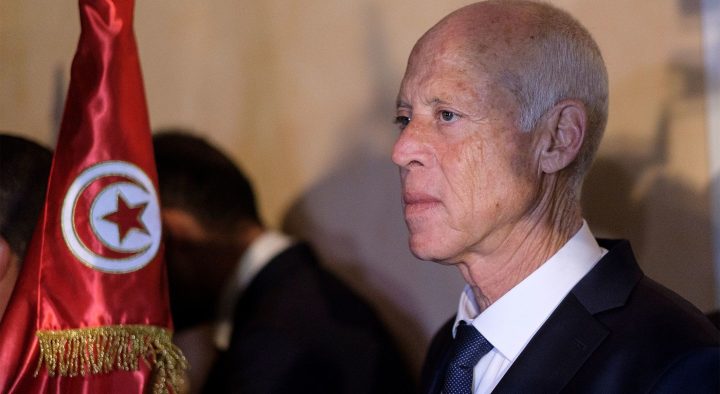ISS TODAY OP-ED
Tunisia’s xenophobic agenda is hastening liquidity risk for nation’s economy

President Kaïs Saied’s attempt to scapegoat black migrants is costing the country socially, economically and diplomatically.
In a 21 February national security council address, Tunisian president Kaïs Saied accused sub-Saharan African immigrants of fostering “violence, crime and unacceptable practices”.
Drawing on rhetoric reminiscent of Western far right conspiracy theories, he denounced “hordes of immigrants” whom he suspected of being part of a ‘plan’ to disrupt Tunisia’s demographic composition and alter the country’s identity. Ironically, North African — including Tunisian — migrants are routinely at the receiving end of such discourse in Europe.
His comments unleashed a wave of racist violence across the country, exposing black residents to abuse and public vindictiveness. In response, the governments of Guinea, Côte d’Ivoire, Mali and Burkina Faso, among others, organised evacuations of their citizens out of Tunisia.
Homeowners in the country unilaterally evicted sub-Saharan tenants, throwing entire families onto the streets. Employers laid off already underpaid black workers, often illegally withholding outstanding wages. And members of migrant communities have since reported record levels of verbal and physical abuse, sometimes captured in videos that went viral on social media.
Once marginal on the political scene, a rising nationalist discourse conflating xenophobia with patriotism has recently gained traction in the national media, extending its audience and influence. Saied’s remarks provided further validation.
The president’s comments triggered condemnation from some anti-racist movements but also revealed the extent of underlying racism in Tunisia. The country has long struggled with a mixed heritage of African and Arab-Berber culture, downplaying a history of slavery that still underpins social representations of dark-skinned communities. Anti-racist movements that proposed a provision on the matter during the drafting of a new constitution following the 2011 revolution were accused of “trying to create a problem that doesn’t exist.”
Migrants aside, an estimated 10% to 15% of Tunisians are black. They form a sizeable minority that has long experienced marginalisation and systemic belittling. A 2018 anti-racism law — an innovation in North Africa — allowed black Tunisians to remove ‘atig’ from their names, a prefix signalling filiation with enslaved ancestors. But an economic crisis and rising populism have made it hard for the legislation to bear fruit and change mindsets. Some are now openly calling for its abrogation.
Since the 2011 removal of former dictator Zine el Abidine Ben Ali in a popular uprising that started the Arab Spring, institutional instability and Covid-19 have weakened the economy. A public debt worth 89% of GDP, rampant inflation, a continuous drop in currency value, and high unemployment rates, particularly among youth, reflect a dire situation and widespread social despair.
The Economist cites “a survey conducted last year by a pro-business think-tank [that] found that 71% of public-university graduates want to emigrate.” Proportions are probably even higher among less educated youth. Some 18,000 Tunisians crossed over to Italy just last year — almost seven times more than the 2,600 who did in 2019, when Saied assumed office.
Amid protracted job and food staple shortages, blaming black migrants is a convenient diversion for leaders short of solutions. But it lacks evidence. While a popular narrative claims that over one million sub-Saharan migrants are jamming the job market, specialised organisations cite just 50,000 to 60,000 of them in the country, of which about 21,000 are thought to lack documentation.
Most migrants are employed in low-pay, labour-intensive jobs such as construction or housework. Migrants told journalists and researchers that a dysfunctional administration and cumulative financial penalties made getting their paperwork in order nearly impossible.
Consistent democratic backsliding over the past few years hasn’t restored hope or eased social tensions. Since July 2021, Saied has methodically dismantled the country’s hard-fought-for democracy. He suspended parliament and sent army tanks to bar its access, giving himself power to rule through executive orders. A constitutional lawyer by profession, he siphoned judicial authority to consolidate his own.
Most recently, Saied cracked down on critics in a series of politically motivated arrests targeting rival politicians, sceptical entrepreneurs and non-submissive journalists. That he would now unbolt recent anti-racism gains isn’t surprising.
Scapegoating sub-Saharan Africans for Tunisia’s hardships won’t solve the country’s economic slump. In fact, it could backfire. Key financial partners have condemned Tunisia’s xenophobic turn, halting economic partnerships. In early March, the World Bank’s exiting boss David Malpass instructed a suspension of cooperation with Tunisia on ethical grounds, citing the country’s racist drift.
The decision came after Tunisia’s failed negotiations with the International Monetary Fund, which recently put the brakes on a $1.9-billion loan under discussion. The country now faces liquidity risks unless it undertakes major reforms.
Meanwhile, civil society and economic operators in West African countries and beyond have called for boycotts of Tunisian products. The financial fallout may be limited, as sub-Saharan Africa represents a mere 3% of Tunisian exports, but its symbolic significance is clear.
A further deterioration in its economic, financial and diplomatic posture is the last thing Tunisia needs. Authorities have backpedalled on their initial statements, but fixing relations with sub-Saharan Africa will take more than denials and Pan-African lip service. Much work is required for Tunisia to recognise its rich, multifaceted heritage, which should be a strength, not a stumbling block.
The country must confront its racism, which has become normalised. The remains of its once vibrant civil society and democratic movement still fight for an honest, value-based conversation but activists need support in the face of rising authoritarianism. International human rights defenders and donors should provide assistance and funding as required. Nationalist discourse that condemns receiving foreign funding makes external support both harder and more necessary than ever.
Saied’s triggering comments and the public hatred they released also reflect a policy agenda that has demonised migration in North Africa for years under the impulse of European migration policies. Tunisia’s Global North partners — especially Fortress Europe — should learn from this episode. DM
Ornella Moderan, Consultant, Institute for Security Studies (ISS) Pretoria.
First published by ISS Today.




















 Become an Insider
Become an Insider
Comments - Please login in order to comment.